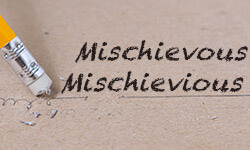
The English language has many words and terms that are frequently misspelled due to their complex structure, derivation from other languages, or phonetics. In academic writing, commonly made spelling mistakes can impact the quality, credibility, and academic integrity of your paper. A word with a complex structure, contrast in spelling and pronunciation, and that often causes difficulties and confusion among students, is “mischievous” or “mischievious.”
Inhaltsverzeichnis
The correct spelling of “mischievous”
The word “mischievous” is an adjective, describing someone who has a tendency to cause minor trouble in a playful way without any bad intent behind it or meaning to cause harm. It typically describes behaviour that is slightly annoying and teasing.
“Mischievous” was adopted back in the Middle English era, and its origins can be traced back to the Old French word “meschevous,” which stems from the noun “meschief.” “Meschief” translates to “harm” or “misfortune.” The constellation of the word is made up of the prefix “mes-,” meaning “badly,” and the noun “chief,” meaning “head” or “end.” In accumulation, the direct translation means “bad ending” or “bad outcome.”
Correct spelling
mischievous
Incorrect spelling
mischievious
“Mischievious” with an extra “i” before the “ous”-ending is the most common spelling mistake of the word “mischievous.” This misspelling likely derives from a common misinterpretation of the pronunciation, adopted by the way it is spoken out in everyday dialogue, or similarly structured words that do contain an “i” before the “ous”-ending. The only correct way of spelling the word is “mischievous” with three syllables and no extra “i” between “v” and “-ous.”
Mnemonic for spelling “mischievous”
Keep in mind that the word “mischievous” only has three syllables. The following mnemonic may help you remember the correct spelling of the word.
Note: “Miss Chief’s Usual Mischief.”
- Miss: The common prefix “mis-“
- Chief’s: The middle word “-chiev-” without an “i”
- Usual Mischief: “Us-” refers to the ending “-ous” right after the “v.”
FAQs
The correct spelling is “mis-chie-vous.” Remember it only has three syllables.
Many mispronounce the word often as “mischievious,” adding an extra “i,” making it sound like it has four syllables.
“Mischievous” describes a slightly bad or annoying behaviour. It has a playful connotation, and there is typically no harmful intent behind it.
Some synonyms for “mischievous” are:
- Bad
- Naughty
- Misbehaved
- Disobedient
- Troublesome
- Playful
- Teasing
- ✓ Free express delivery
- ✓ Individual embossing
- ✓ Selection of high-quality bindings
